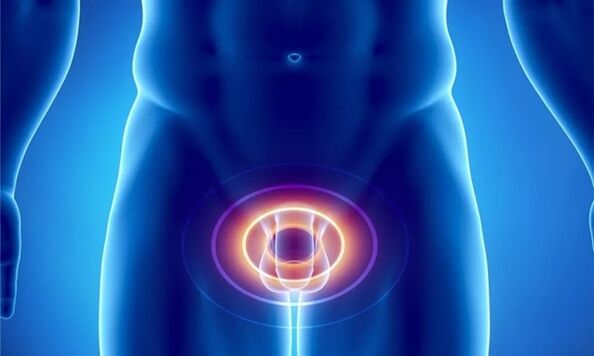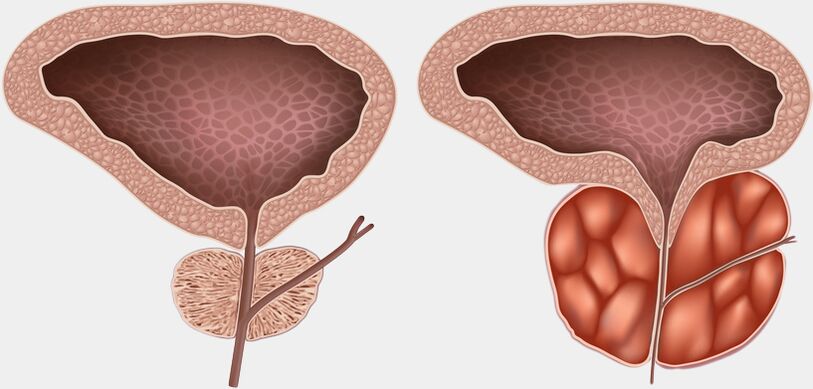
The prostate plays an important role in the functioning of the male body - it normalizes the existence of sperm, dilutes sperm, and is involved in regulating hormone levels.
Today, according to statistics, prostatitis in men is quite common - 30% of men aged 30-55 suffer from this pathology, which is an inflammatory phenomenon in the prostate gland.
Forms of prostatitis
Experts distinguish several pathologies:
- Chronic bacterial - a chronic type of pathology caused by a bacterial infection;
- Chronic abacterial - a chronic inflammatory process caused by non-infectious causes;
- Acute form of pathology - chronic pain attacks in the genital area;
- The asymptomatic form of the pathology is difficult to determine, usually only after regular preventive examinations.
Signs of prostatitis
How does prostatitis manifest itself? In general, doctors identify six symptoms that indicate prostatitis. If a man has noticed at least 2 signs from the list, you should definitely see a doctor:
- Weak rainy urine with short range;
- Difficulty urinating;
- Painful phenomena while urinating;
- Duration of urination, urine splashes, intermittent flow;
- Partial emptying of the bladder;
- Frequent urge to urinate, especially at night.
The doctor will always be able to determine the first signs of prostatitis in men, and after diagnosis, treatment will be given in a timely manner with a positive result.
Causes of pathology
Experts talk about the following causes of the disease:
- Weakened immunity - protective barriers that prevent the occurrence of many viral infections are reduced;
- Infectious processes - viral elements, microbes, bacteria enter the prostate through the blood or lymphatic pathways. A sign of this phenomenon is that the temperature rises with prostatitis;
- Sedentary lifestyle - interrupts blood supply, causes lack of oxygen;
- Circulatory disorders occur due to stagnant moments in the genital area - the sex life of sex life, long abstinence from sexual intercourse, irregular sexual intercourse.
Inflammation of the prostate can begin due to the penetration of microbes, but the development of the infection requires a pathogenic microflora, which can develop due to the following factors - harmful addictions, constipation, hormonal disorders, trauma, hypothermia, etc.
Symptoms of pathology
How does prostatitis manifest itself? Important symptoms indicating the onset of prostatitis are a difficult urination process, painful feelings at this moment. Frequent urge to empty the bladder in small doses indicates the development of pathology. Therefore, in this situation, you should definitely see a doctor, otherwise the inflammation will become a chronic structure.
The initial stages of the pathology may be asymptomatic. Acute forms of the disease are much easier to identify - the manifestation of the pathology is always sudden, sharp. It should be taken into account that the course of the disease is due to the individual characteristics of each person's body.
The following symptoms of prostatitis are distinguished:
- Painful feelings in the perineal region;
- Temperature increase;
- Defecation is accompanied by painful attacks;
- Potential disorders;
- Frequent urination
- Increased sweating;
- General malaise;
- Feeling full in the bladder;
- Irritability, sudden mood swings;
- Excretion phenomena from the urethra during bowel movements.
Usually, only a few of the above points appear.
Temperature rise
The development of the acute form of the pathology is characterized by intoxication of the body, a febrile state, and the temperature associated with prostatitis can reach 40 degrees. Syndromes of manifested pathology - violations in the field of urination. Acute prostatitis requires timely treatment, otherwise it can lead to negative consequences, even until surgery.
The protracted decision on medical examination can affect the transformation of the pathology into a chronic form, with a long developmental time that requires high financial costs to treat.
Pain attacks with the development of pathology
The complex structure of prostatitis is accompanied by painful symptoms. Pain in prostatitis in men is not characterized by precise localization. In the absence of a treatment process, pain attacks intensify and spread to other genitals. In advanced situations, the acute stage of the disease, the adenoma, develops.
It is known that pain in men with prostatitis is short-term, long-lasting.
Regular painful attacks lead to an unpleasant lifestyle, the development of neuroses in men, and a deterioration in quality of life.
Usually, painful feelings occur in the following moments:
- While urinating;
- During an erection;
- During sexual intercourse;
- After the intercourse is over;
- During defecation;
- Prolonged self-restraint or, on the contrary, promising sexual intercourse;
- After hypothermia;
- Due to severe physical stress.
The lower back begins to ache when the pathology develops outside the prostate gland. The onset of pain is dull or sharp. Neglecting the pathology can cause painful feelings for a long time. This is why it is so important to consult a urologist in time because inflammation can get into the kidneys.

In addition, pathologies of the prostate area are characterized by dull or sharp painful attacks in the lumbar region, rarely on the legs.
The following methods can be used to eliminate painful feelings:
- Prostate massage;
- Phytotherapy treatment;
- Hormonal methods of treating pathology;
- Special diet to normalize a person's condition;
- Antibacterial methods for removing harmful elements;
- Use of adrenergic blockers to relieve urination.
Prostate adenoma or prostatitis?
Prostate adenoma is a benign tumor of the prostate, this pathology is usually observed in men after 45-50 years. Hormonal imbalances are recognized as an important cause of pathology - the levels of male hormones change and decrease over the years. There are also risk factors that contribute to the onset of pathology - obesity, stress, atherosclerosis, harmful addictions.
The manifestation of the pathology is pronounced, so it is possible to make an accurate diagnosis in the first stage of development.
The course of prostate adenoma in men is characterized by progression, development, the tumor triggers new clinical moments.
The symptoms of prostate adenoma and prostatitis are similar in the strong half of humanity - frequent difficulty urinating, burning sensation in the prostate, pain.
The course of prostate adenoma disease in men depends on the stage of the pathology.
The consequences of prostate adenoma in men are severe - renal failure, cystitis, urolithiasis.
Diagnostic measures
Your doctor can identify signs of prostatitis in men and prescribe treatment in a timely manner. To determine prostatitis, you should consult a urologist who will perform an examination and prescribe other important diagnostic procedures:
- Medical examination for general clinical imaging;
- Performing urine tests;
- Tests for STDs;
- To determine the presence or absence of infections, a swab is taken from the urethra;
- Ejaculate analysis;
- Genital ultrasound;
- Urography;
- Biopsy - if cancer is suspected.
Using the results of the above processes, the physician compiles a treatment regimen for a particular patient for the disease.
Methods of treating prostatitis
How to treat this pathology? After diagnosing the disease, the doctor determines the treatment regimen of the pathology, usually using an integrated approach, which consists of the following points:
- Antibacterial Therapies - One skilled in the art will prescribe medication, namely antibiotics to eliminate the harmful trace elements that lead to prostatitis. They also lower the temperature;
- Physiological effects such as laser, ultrasound, electromagnetic waves.
- Traditional treatment methods are used - hot bath procedures with herbs;
- Massage is performed in the area of the prostate - frees the ducts from stagnation, increases the blood supply to the genitals;
- Herbal medicine - the use of decoctions from useful herbs and dietary supplements helps to strengthen the immune system, fights infections;
- Psychotherapeutic methods - due to prostatitis, negative psychological problems develop in a person, trust disappears, fears appear during intercourse;
- Surgical treatment methods are used in advanced and severe stages of pathological development, such as prostate abscess;
- Correction of the immune system - the doctor may prescribe certain vitamins, minerals, beneficial trace elements to strengthen the patient's immunity;
- Balanced, proper nutrition in case of prostatitis, rejection of alcoholic beverages, smoking, fatty foods, restriction of salt intake, and consumption of more ordinary water - at least 2 liters per day.

Preventive measures
It is important to monitor your health. In order to prevent the development of prostatitis, exposure to factors that may cause:
- Do not overcool;
- Eat a balanced, healthy diet;
- Do physical exercises, play sports;
- Have sex with a regular partner, protect yourself against STDs;
- Examine your urologist annually to diagnose the presence or absence of the disease in a timely manner.
























